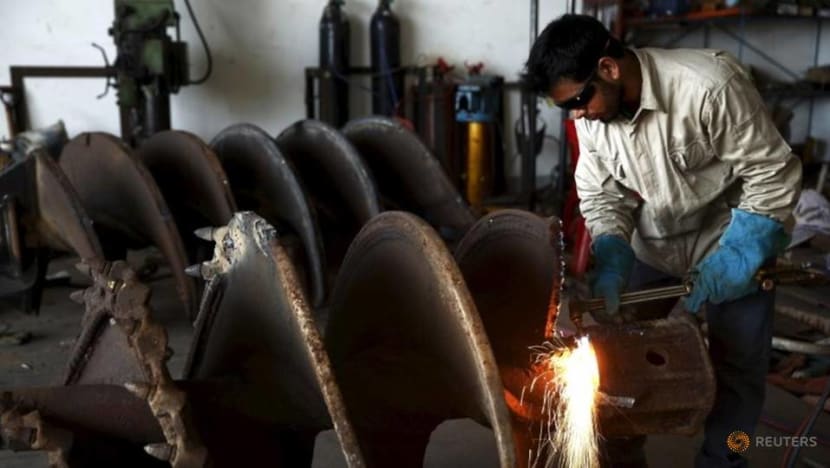Singapore’s factory activity shrinks to lowest reading since November 2008 amid COVID-19 outbreak

A worker welding steel at a factory in Jurong. (File photo: Reuters)
SINGAPORE: Singapore’s factory activity shrank for the third consecutive month in April amid a “circuit breaker” period to curb the spread of COVID-19, making it the lowest reading since November 2008.
The Purchasing Managers’ Index (PMI) for April came in at 44.7, down 0.7 point from the previous month, according to data released by the Singapore Institute of Purchasing and Materials Management (SIPMM) on Monday (May 4).
A PMI reading above 50 indicates that the manufacturing economy is generally expanding, while a reading below 50 indicates that it is generally declining.
April’s reading was attributed to “faster contractions in the key indexes of new orders, new exports, and factory output”, said SIPMM.
The indexes of finished goods, input prices, and order backlog, also recorded slower contractions, it added.
The imports index posted a faster contraction rate at 45.5 – the lowest since October 2012 when the reading was also at 45.5.
The electronic sector also contracted, dipping 1.3 points to 42.8 last month. This was the lowest recorded reading since December 2008, said SIPMM.
SIPMM’s vice president of industry engagement and development Ms Sophia Poh said that anecdotal evidences suggest that many manufacturers were “grappling with order cancellations resulting from the global containment measures of the COVID-19 pandemic”.
“The supply chain operating environment has also weakened considerably with the extension of our local circuit breaker measures that affect production capacity and responsiveness,” Ms Poh added.
Ms Selena Ling, head of treasury research and strategy at OCBC Bank pointed out that Singapore’s decline in PMI has been more muted in comparison to regional neighbours’ including Indonesia, Myanmar, Malaysia and Philippines.
READ: More companies announce wage cuts, no-pay leave amid COVID-19 economic downturn
She said that it was likely that the Unity, Resilience and Solidarity Budgets, as well as other measures announced to support those affected by COVID-19, have “helped to buffer the downside risk in terms of the economic fallout” during the circuit breaker period.
Ms Ling added that even if containment and social distancing measures in Singapore and in the region were gradually eased, a “deterioration of US-China bilateral relations will again pose a potential headwind” for the second half of the year.
BOOKMARK THIS: Our comprehensive coverage of the novel coronavirus and its developments
Download our app or subscribe to our Telegram channel for the latest updates on the coronavirus outbreak: https://cna.asia/telegram













